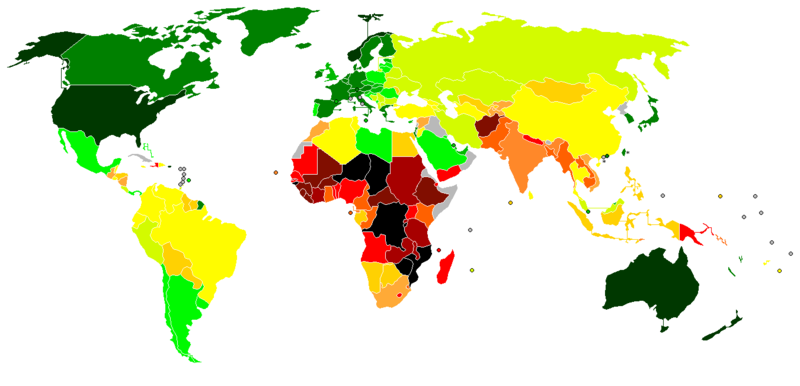A busy day for blogging, but current affairs at the moment should be of interest to all of us, and not just because we are geographers, but also because of the potential implications for the oil dependent countries if the geopolitics of the Middle East continue to unravel.
We are all aware of the now escalating conflict in Libya, following the unrest in Egypt, and in addition to the severe political turmoil in Yemen, Morocco, Oman and Bahrain among others. The AS have just completed their studies of geopolitics, and you should all be able to correlate the recent raise in fuel prices to the level of unrest in the worlds largest oil producing regions.
So, how do we look at this as geographers? Firstly, the humanitarian costs, protest and conflict lead to direct social effects on local populations, there is currently mass migration out of Libya, estimated at around 1000 people per hour. Where are they going? Tunisia, Egypt and Algeria, none of which are regions prepared for mass migration of refugees due to environmental and political constraints. On a wider scale, the UK has evacuated ex pats living in Libya, Egypt is currently setting up a democratic government following the fall of Mubarak, and although the West would certainly welcome more stability and more democracy in the East, it will certainly not happen overnight. The economic implications are certainly concerning, from a national scale, BA stated their ticket prices will have to go up to accommodate the increase in fuel, right down to your pockets, with petrol possibly going up to 145p per litre, those of you with new cars may well find you cant afford to drive them very far! (Today's prices were 130.9 for unleaded and 136.9 for diesel).
In order to understand this, there are some fantastic resources online, I am by no means knowledgeable about the Middle East, but the BBC are and they have produced this click able and updated map of the region and a description of the current situation.
There are some interesting statistics on here, each country has some details taken from a variety of rankings. The first of which is the Corruption ranking, produced by Transparency International, a non political global civil organisation. Their 2010 survey has been mapped, and reproduced below to show the most corrupt and least corrupt places in the world:
So, is there a link between development ranking and corruption ranking? Call me sad, but I decided to test my spearmans ranking powers on excel, and after much frustration and shouting at my computer, there is a significant relationship. Using 48 countries, the top 20, bottom 20 and middle 8 (there weren't ranks for two of them on the corruption index) the result came out at 0.797, a strong positive correlation between corruption and development, for 48 sets of data to be accepted at 99.9% the result needs to be over 0.52. Clearly the relationship is significant, but is the solution to corruption development? By looking at GDP ranks, the story is different, using the same criteria, the bottom and top 25 countries on both ranks, the result is 0.413, therefore rejected. Interesting, the countries that tip the scale are the BRIC group - without India who didn't make it into my criteria for selection (China - 5745 000 Million US$ and a 3.5 on corruption, Brazil - 2024 000 and 3.7, Russia - 1477 000 and 2.1 and Mexico - 1004 000 and 3.1) at the other end of the scale, there are some very low ranked countries on GDP, whose corruption ratings are high, notably Dominica (575 and 5.2), Samoa (556 and 4.1) and the Seychelles (119 and 4.8).
Back on topic, the statistics are interesting, and the situation in the Middle East should be one you are all following, the news tonight is that Obama is considering enforcing a no fly zone over Libya, and along with David Cameron is calling for Gaddafi to step down. What is the likelihood of Obama stepping in with a Military response? Hopefully low, opening up a third active front would be unpopular, and possibly a bad idea, however, US oil has hit a 2 and a half year high, and re-election is 2012 (also notably the year that the as yet unsigned by America Kyoto agreement runs out with no legally binding successor).
Updates to follow, keep an eye on the news and learn about the Middle East.
Thanks for reading!



No comments:
Post a Comment